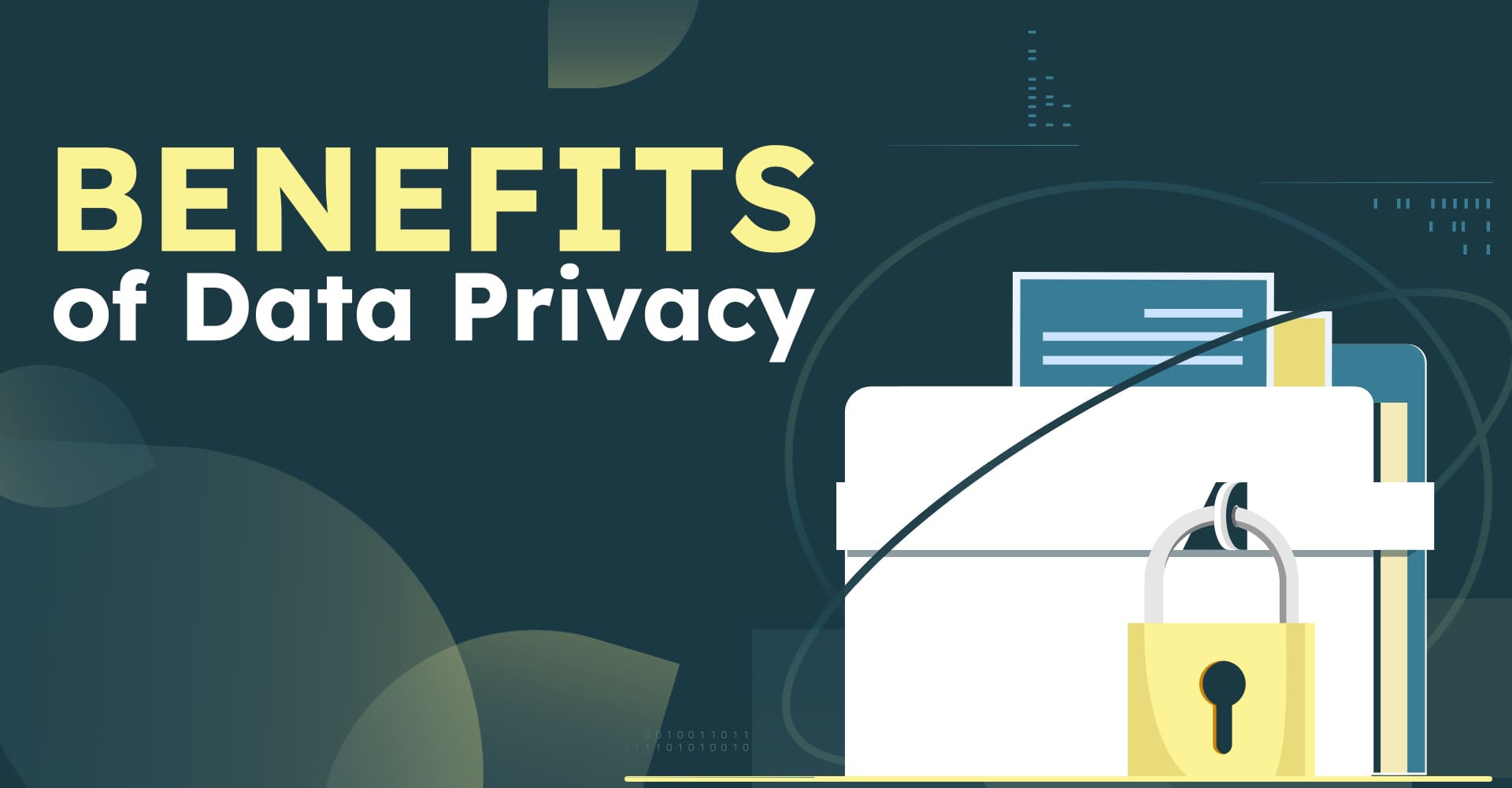The Benefits of Data Privacy: Why It's Meant To Be Taken Seriously

Table of Contents
Every day, for a multitude of reasons, people share their personal information online on a variety of platforms. For this reason, customers want to be sure organizations collecting their data will keep it secure.
Data privacy refers to the protection of personal and sensitive information from unauthorized access, use, disclosure, or destruction. The idea of data privacy and the practice of data security are critical issues for organizations that collect, store, and process customer data.
According to the University of Maryland, a data breach occurs every 39 seconds. To defend against this, the ways in which your business collects, protects, and uses information need to be a priority if you want to build trust with your customers.
Data privacy regulations—like the General Data Protection Regulation (GDPR) in the European Union or the California Consumer Privacy Act (CCPA) in the United States—also play a critical role in protecting customer data. These types of regulations require businesses to obtain explicit consent from customers before they collect their data and provide customers with the right to access, correct, and delete their data.
Why is Individual Data Privacy Important?
Every person is entitled to the safe and careful handling of their personal information — a right that is enshrined under law in dozens of countries. Safeguarding individual data privacy means personal information stays private and out of reach from malicious parties like hackers. This helps boost the entire economy — when consumers feel safe with their credit card details and home addresses, they'll engage in more online purchases, sign up for more informational products, and generally trust businesses with their data.
Individual data privacy helps both businesses and consumers. For businesses, it means a distinct advantage in terms of trust and brand recognition. And for consumers, it's the safety of being protected from data breaches, fraud, and financial loss. After all, 79% of people in the U.S. feel concerned about the lack of control they have over their privacy. Hence, investing in data privacy goes a long way as we explain below.
Benefits of Data Privacy: Why You Should Make it a Priority
Simple data privacy practices have been the foundation of business operations for decades, and many organizations have data privacy policies already present in their business plans.
This is because solid data privacy practices have real-time positive impacts in terms of consumer trust, company security, and business success.
Conversely, poor data privacy practices—as well as a failure to comply with data privacy regulations—can bring severe penalties and damage to a company's reputation. Therefore, it’s crucial for business leaders to realize the costs and benefits of data privacy practices.
Let's show you some more benefits of data privacy:
Data Privacy Helps Companies Stay Compliant
It’s essential that companies adhere to data privacy laws, regulations, and standards. These standards establish a framework around which your company can guarantee that personal information is handled securely, effectively, and transparently.
Here are some ways data privacy practices help companies stay compliant with data privacy laws:
- Data inventory: Data privacy practices help companies identify the types of personal data they collect, process, and store. This makes it easier to classify different data sets in order to apply appropriate privacy controls and protect against unauthorized access.
- Data transparency: Data privacy practices also help companies obtain explicit, informed consent from individuals. This must be accomplished before an organization collects, processes, and stores personal data because doing so provides clear, concise communication around the scope of data collection. Data transparency enables companies to stay in compliance with laws that require them to inform individuals about data processing activities.
- Security access controls: Comprehensive data privacy practices implement privacy, security, and access controls to protect personal data from unauthorized disclosure. This includes encryption, firewalls, monitoring, analytics, logging mechanisms, and more that protect personal data.
Data privacy practices empower companies to comply with data privacy laws by simplifying the classification, protection, and collection processes. When these practices are in place, an organization can demonstrate its commitment to data privacy as it builds trust with stakeholders.
Data Privacy Builds Trust
Individuals expect their information to be kept secure and to be used only for the purposes outlined by a company’s data privacy policy. Individuals also expect that only certain people will have access to their information.
It might surprise consumers to know that, according to a 2021 data risk report conducted by Veronis, 64% of financial companies surveyed had more than 1,000 sensitive files accessible to every employee.
It’s in your business’s best interest to prioritize data privacy and enact processes and policies that protect a person’s personal information. Doing so demonstrates a commitment to ethical business practices and helps build trust between the business and its customers.
Data privacy practices also protect against data breaches that can devastate a business. Strong data privacy practices help businesses protect their customers' personal information from being compromised.
Customers want to feel like their personal information is being handled with care and respect, and your data privacy policy and practices—or lack of either—sends a message about how much you value each individual’s data security.
Data Privacy Reduces the Risk of Fines and Financial Loss
The implementation of a robust data privacy policy enables a company to reduce the risk of financial loss in several ways. Let's take a closer look:
- Data privacy helps avoid data breaches: Data breaches can be costly for companies’ finances and reputation. A robust data privacy policy and complementary procedures give companies the security to reduce the risk of data breaches and associated costs.
- Data privacy prevents identity theft and fraud: According to Verizon, 71% of data breaches are financially motivated. Organizations that collect and store personal information like financial data are at greater risk of identity theft and fraud. Companies are able to prevent unauthorized access to and misuse of information when they can secure sensitive data.
- Data privacy ensures compliance with data protection regulations: Many countries and jurisdictions have laws and regulations that mandate data protection and privacy. Compliance with these regulations helps companies avoid legal penalties, fines, and other financial liabilities.
- Data privacy helps protect intellectual property: Companies that develop intellectual property (IP) like patents, trademarks, or trade secrets are at risk of data theft. Organizations can protect their IP and avoid financial losses due to infringement or misappropriation when they secure this information through data privacy measures.
Data privacy is an essential company practice that involves a degree of risk management. It’s easier to avoid financial losses or fines and minimize the negative consequences of a data breach when you’re able to protect sensitive information from unauthorized access, misuse, or theft.
Data Privacy Enhances a Firm's Reputation
Without strict privacy, your organization is vulnerable to reputational damage. By safeguarding your customers’ privacy, you’ll avoid unnecessary penalties while unlocking unseen reputational value for your brand. Overall, compliance with data privacy will improve customer loyalty, reducing churn and boosting top-line revenue.
Customers want to do business with companies that are serious about keeping their data secure. Furthermore, if your organization collects personal data from its customers, you must comply with data privacy rules and regulations to attract more business. This compliance is mandatory for companies that want to distinguish themselves from their competition in the eyes of prospective customers.
Enzuzo Makes Data Privacy Easy
Enzuzo data privacy experts specialize in solutions so organizations can identify data security gaps, implement appropriate data privacy policies, and address data privacy needs.
We make sure that our clients understand relevant data privacy laws and regulations like GDPR, CCPA, and PIPEDA so they can develop policies and procedures that align with these regulations. Enzuzo’s data privacy professionals also provide solutions for ongoing compliance monitoring and reporting.
Our training and education resources around data privacy best practices also help our client organizations surface data privacy risks. This makes it easier to develop a company culture around data privacy.
Data Privacy Benefits FAQs
What are the advantages of data privacy?
Data privacy practices establish trust between an organization and its consumers and ensure that a company is compliant with regional and global data privacy regulations. Solid data privacy practices have real-time positive impacts in terms of consumer trust, company security, and business success.
What is the difference between data privacy and data security?
Data privacy refers to the protection of personal information from unauthorized access or disclosure. It is concerned with how personal information is collected, used, stored, and shared.
Data security refers to the protection of data from unauthorized access, use, disclosure, modification, or destruction. It involves the use of technical and procedural controls to make sure that information is confidential, integrity of protection is strong, and availability of access is limited.
Who is responsible for protecting data privacy?
Organizations that gather personal information are responsible for the protection and security of that data, but individuals and governments also share some responsibility.
Companies provide transparent data privacy policies to consumers who trust those companies with their data, and governments enact regulations to hold companies accountable for compliance.

Osman Husain
Osman is the content lead at Enzuzo. He has a background in data privacy management via a two-year role at ExpressVPN and extensive freelance work with cybersecurity and blockchain companies. Osman also holds an MBA from the Toronto Metropolitan University.
